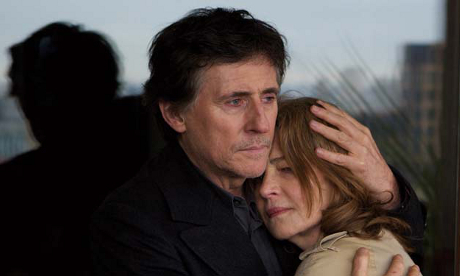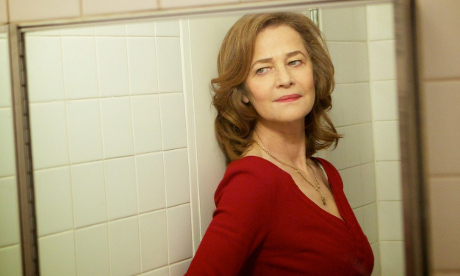Director: Barnaby Southcombe
Writer: Barnaby Southcombe, Elsa Lewin (novel)
Year: 2012
Cast: Charlotte Rampling, Gabriel Byrne, Eddie Marsan
★★★★☆
Screening in both Edinburgh and Glasgow as part of the Scottish Mental Health Arts and Film Festival, I, Anna is a neo-noir thriller with a psychological twist. Charlotte Rampling stars as the title character, a mature femme fatale who is suffering from amnesia and dissociation due to a traumatic experience that takes place at the end of a singles night.
The film is directed by Rampling’s son, Barnaby Southcombe, who presents the story from Anna’s perspective and places the emphasis on her precarious state of mind. Reading the novel by Elsa Lewin, a psychoanalyst based in New York, he immediately identified the title character with his mother, even though the ‘story was not her own’. It is evidently a personal film, and this becomes increasingly obvious as the narrative develops and we realise that behind the mystery there is something far more significant at stake.

The adaptation moves the action from eighties New York to present day London, emphasising Southcombe’s varied European influences. The director makes excellent use of his surroundings as the capital is transformed into a brooding concrete menace, centred around the brutalist towers of the Barbican complex. The environment is oppressive and has a looming, crushing sterility, which seems to serve as a warning to those hoping to find anything genuine in the warm, bubbly atmosphere of the singles bars.
However, there is an unlikely romance at the core of I, Anna. It begins inauspiciously, as Rampling’s character meets DCI Bernie Reid (Gabriel Byrne) at the scene of a murder and leaves with a discarded umbrella that clearly does not belong to her. With his own demons to battle, Bernie is no less unhinged than Anna and quickly develops an obsession with this elusive woman, who lives in a small one-bedroomed flat with her daughter and granddaughter. The camera is drawn to Rampling’s figure; it is often framed or shown in close-ups, sliding down her legs, demonstrating that older women too can be dangerously seductive.
The retro elements and heavily stylised look of the film work well, giving it an unreal quality that seems to reflect many of the characters’ states of mind. Anna is frequently found in phone boxes, no doubt a nod to the noir of the past, but it also serves to intensify the mystery and has a genuine narrative purpose. As an aesthetic device it is effective, particularly during the scene in which Anna and Bernie first meet, and, like all of I, Anna‘s initially improbable elements, it makes perfect sense by the end.
The soundtrack also pleasantly surprises, comprising a bleak, atmospheric score by French electronic duo K.I.D., interspersed with acoustic tracks by indie crooner Richard Hawley. Southcombe originally had something very different in mind, a lyrical piano score, but it did not work, and it is difficult to see how it could. The dark electronica seems to bleed from the dense concrete and Hawley’s voice is superbly aligned with those of the central characters.
There is a smart twist at the end which strips away the foundations of what has been constructed, but rather than complicating matters, it sheds light on much that had remained in doubt. It is, in fact, crucial to the success of the narrative, taking attention away from the comparatively weak murder mystery, which has been designed to facilitate the intriguing character study rather than the other way around.

The performances of the leads are key to the film and they are able to carry it through the early stages when the narrative seems convoluted and the cast a few characters too big. Rampling and Byrne have excellent chemistry and we really feel for their haunted characters, particularly as the film reaches its climax. They are perfectly cast and equally comfortable in such uncomfortable roles.
I, Anna is worth persevering with as it quickly develops into a coherent drama that gives renewed purpose to its underwhelming beginnings. There are plenty of tense moments and a couple of shocking scenes, but what stands out is the delicate handling of the relationship at the heart of the story and, particularly in the midst of such a harsh landscape, the almost unbearable fragility of the mind.
Review originally published at the Scottish Mental Health Arts and Film Festival